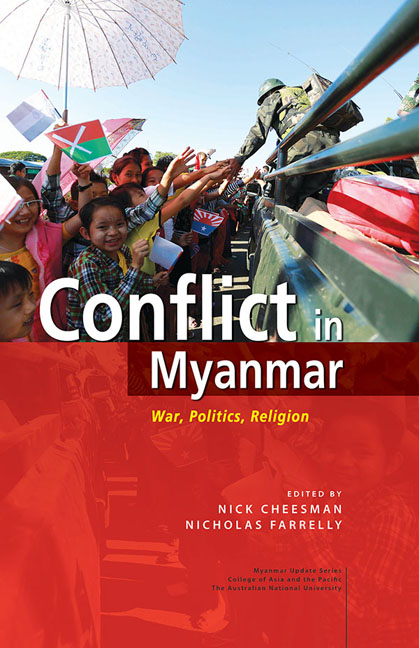Book contents
- Frontmatter
- Contents
- List of Maps
- List of Tables
- List of Figures
- Acknowledgements
- Contributors and Editors
- Part I Introduction
- Part II War and Order
- Part III Elections and After
- Part IV Us and Them
- 12 Making sense of reactions to communal violence in Myanmar
- 13 Public perceptions of a divided Myanmar: Findings from the 2015 Myanmar Asian Barometer Survey
- 14 On Islamophobes and Holocaust deniers: Making sense of violence, in Myanmar and elsewhere
- 15 Buddhist welfare and the limits of big ‘P’ politics in provincial Myanmar
- 16 Threat perceptions in the Myanmar–Bangladesh borderlands
- Part V Conclusion
- Abbreviations and Key Terms
- Index
15 - Buddhist welfare and the limits of big ‘P’ politics in provincial Myanmar
from Part IV - Us and Them
Published online by Cambridge University Press: 22 July 2017
- Frontmatter
- Contents
- List of Maps
- List of Tables
- List of Figures
- Acknowledgements
- Contributors and Editors
- Part I Introduction
- Part II War and Order
- Part III Elections and After
- Part IV Us and Them
- 12 Making sense of reactions to communal violence in Myanmar
- 13 Public perceptions of a divided Myanmar: Findings from the 2015 Myanmar Asian Barometer Survey
- 14 On Islamophobes and Holocaust deniers: Making sense of violence, in Myanmar and elsewhere
- 15 Buddhist welfare and the limits of big ‘P’ politics in provincial Myanmar
- 16 Threat perceptions in the Myanmar–Bangladesh borderlands
- Part V Conclusion
- Abbreviations and Key Terms
- Index
Summary
A few weeks after Myanmar's historic November 2015 national elections, images of opposition leader Daw Aung San Suu Kyi crouching in grass to pick up trash went viral on Facebook. Following high-profile meetings with President Thein Sein, Senior General Min Aung Hlaing and former dictator Than Shwe, Daw Suu made one of her first public appearances since the poll: to collect rubbish in her electorate in Yangon. After fifteen minutes flanked by jostling photographers — who she commanded to “Help pick up the garbage!” — she disappeared back into her car and zoomed away (Fuller 2015).
At the Lady's orders, similar clean ups were occurring across the country, led by local party members and welfare groups. In Taungoo, an hour or so south of Naypyitaw, volunteers from local welfare groups and private schools collected rubbish from the streets surrounding a government housing project next to the railway tracks. Above an entrance to the housing project, a large green signboard erected prior to the November 2015 election declared this a ‘USDP [Union Solidarity and Development Party] village’. That morning though, an oversized dump truck backed slowly through the gate, driven by a member of a local welfare group wearing a red T-shirt of Aung San Suu Kyi's National League for Democracy (NLD).
Within the housing project, in a small clearing surrounded by dilapidated wooden houses and filled with decades of accumulated domestic waste, women bathed and washed clothes from a well while chatting about the spectacle surrounding them. As the dump truck reversed into the clearing, NLD candidates fresh from their political clean sweep of the township a few weeks prior helped a squatter move his makeshift bamboo hut out of the path of the incoming vehicle. A few minutes later, a bulldozer driven by an off-duty policeman began to scoop up piles of old rubbish, lungyis and even a writhing snake, and dumped everything into the waiting truck.
The businessman who donated the industrial vehicles stood proudly alongside the township development officer, watching as decades of accumulated filth was removed. Both took photos on their phones, loading them to Facebook as local residents looked on, bemused yet pleased. “Is this a political campaign?”, I asked the businessman, who was wearing a flashy golf cap to keep the sun off his face.
- Type
- Chapter
- Information
- Conflict in MyanmarWar, Politics, Religion, pp. 313 - 332Publisher: ISEAS–Yusof Ishak InstitutePrint publication year: 2016



